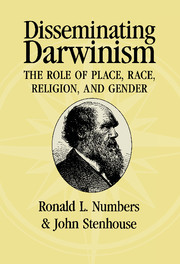Book contents
- Frontmatter
- Contents
- List of contributors
- Acknowledgments
- Introduction
- 1 Science, region, and religion: the reception of Darwinism in Princeton, Belfast, and Edinburgh
- 2 Darwin down under: science, religion, and evolution in Australia
- 3 Darwinism in New Zealand, 1859–1900
- 4 Environment, culture, and the reception of Darwin in Canada, 1859–1909
- 5 Darwinism in the American South
- 6 Darwinism, American Protestant thinkers, and the puzzle of motivation
- 7 Exposing Darwin's “hidden agenda”: Roman Catholic responses to evolution, 1875–1925
- 8 American Jewish responses to Darwin and evolutionary theory, 1860–1890
- 9 Black responses to Darwinism, 1859–1915
- 10 “The irrepressible woman question”: women's responses to evolutionary ideology
- Index
8 - American Jewish responses to Darwin and evolutionary theory, 1860–1890
Published online by Cambridge University Press: 06 July 2010
- Frontmatter
- Contents
- List of contributors
- Acknowledgments
- Introduction
- 1 Science, region, and religion: the reception of Darwinism in Princeton, Belfast, and Edinburgh
- 2 Darwin down under: science, religion, and evolution in Australia
- 3 Darwinism in New Zealand, 1859–1900
- 4 Environment, culture, and the reception of Darwin in Canada, 1859–1909
- 5 Darwinism in the American South
- 6 Darwinism, American Protestant thinkers, and the puzzle of motivation
- 7 Exposing Darwin's “hidden agenda”: Roman Catholic responses to evolution, 1875–1925
- 8 American Jewish responses to Darwin and evolutionary theory, 1860–1890
- 9 Black responses to Darwinism, 1859–1915
- 10 “The irrepressible woman question”: women's responses to evolutionary ideology
- Index
Summary
Darwinism declares … that creation is not to be explained through a miracle but through the natural law of progressive development of life under favorable circumstances. … Does not this view of life … harmonize perfectly with our comprehension of religion, which we do not recognize in form, but in reform, which has its living power in the internal remodeling of Judaism and its Messianic mission as progress toward a completed humanity?
—Kaufmann Kohler, 1874During the 1870s and 1880s, American Jews discussed Darwin and scientific theories of evolution in the context of debates within the Jewish community on the future of American Judaism. Kaufmann Kohler, a prominent American Reform rabbi, appealed to Darwin and evolutionary theory as support for radical Reform Judaism, which emphasized the idea of progressive revelation. The legitimacy of radical Reform, however, was subject to much debate. More moderate Reform rabbis as well as traditionalist Jewish leaders criticized Kohler's support for evolution and the links he made between evolution and radical Reform. Moreover, traditionalists who accepted evolution also attacked Kohler and his fellow radicals, claiming that evolutionary theory actually gave more support to traditional Judaism!
Intracommunity rivalry was certainly not alone in shaping the responses of Jews to evolution. The American Jewish community faced many challenges from without that threatened the integrity and survival of Judaism. Religious leaders pointed to assimilation as the community's most urgent problem, whether it resulted from conversions to Christianity, the appeal of the Ethical Culture Society (founded in 1876 by Felix Adler, son of a prominent Reform rabbi), or the antagonism to religion generated by the growth of agnostic and materialistic thought.
- Type
- Chapter
- Information
- Disseminating DarwinismThe Role of Place, Race, Religion, and Gender, pp. 209 - 246Publisher: Cambridge University PressPrint publication year: 1999
- 4
- Cited by



